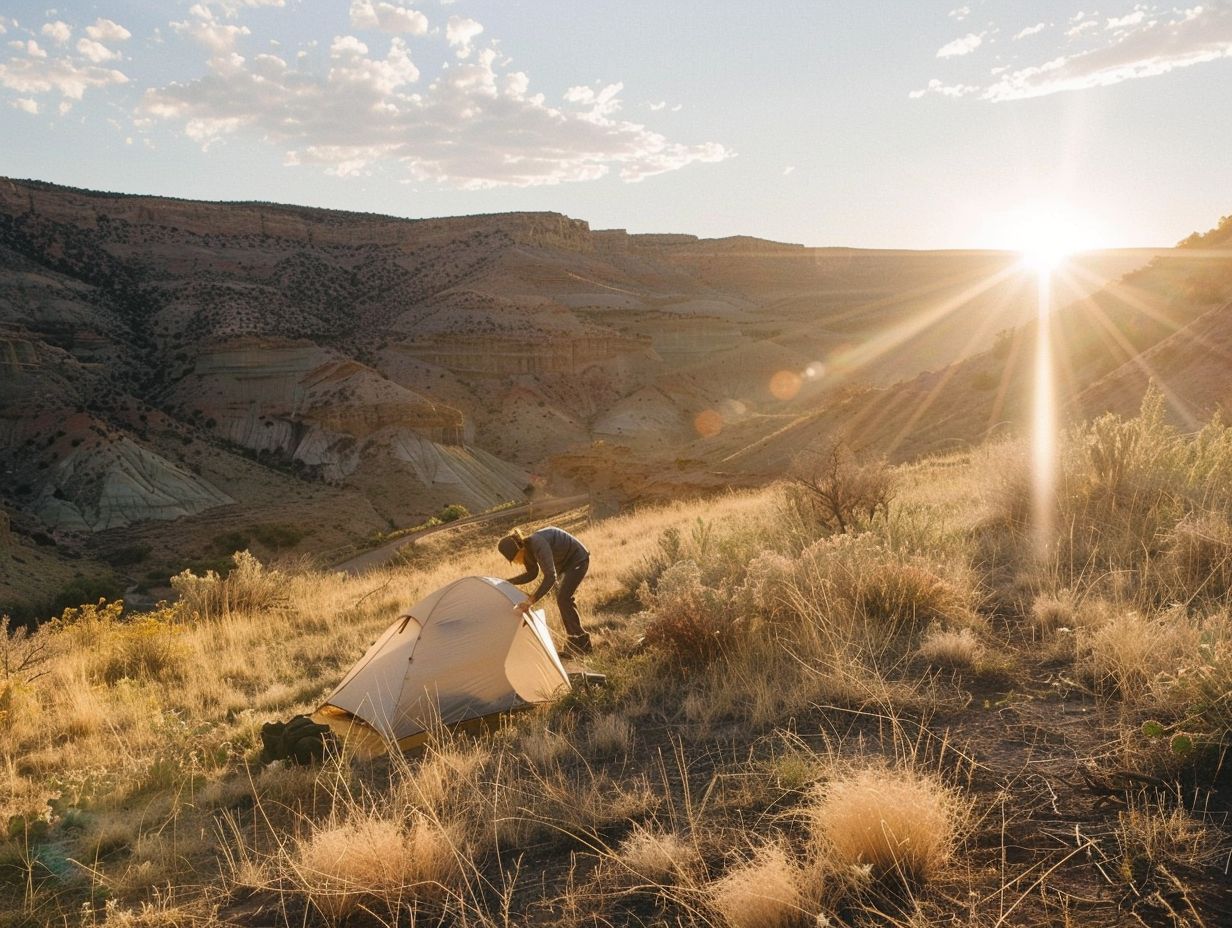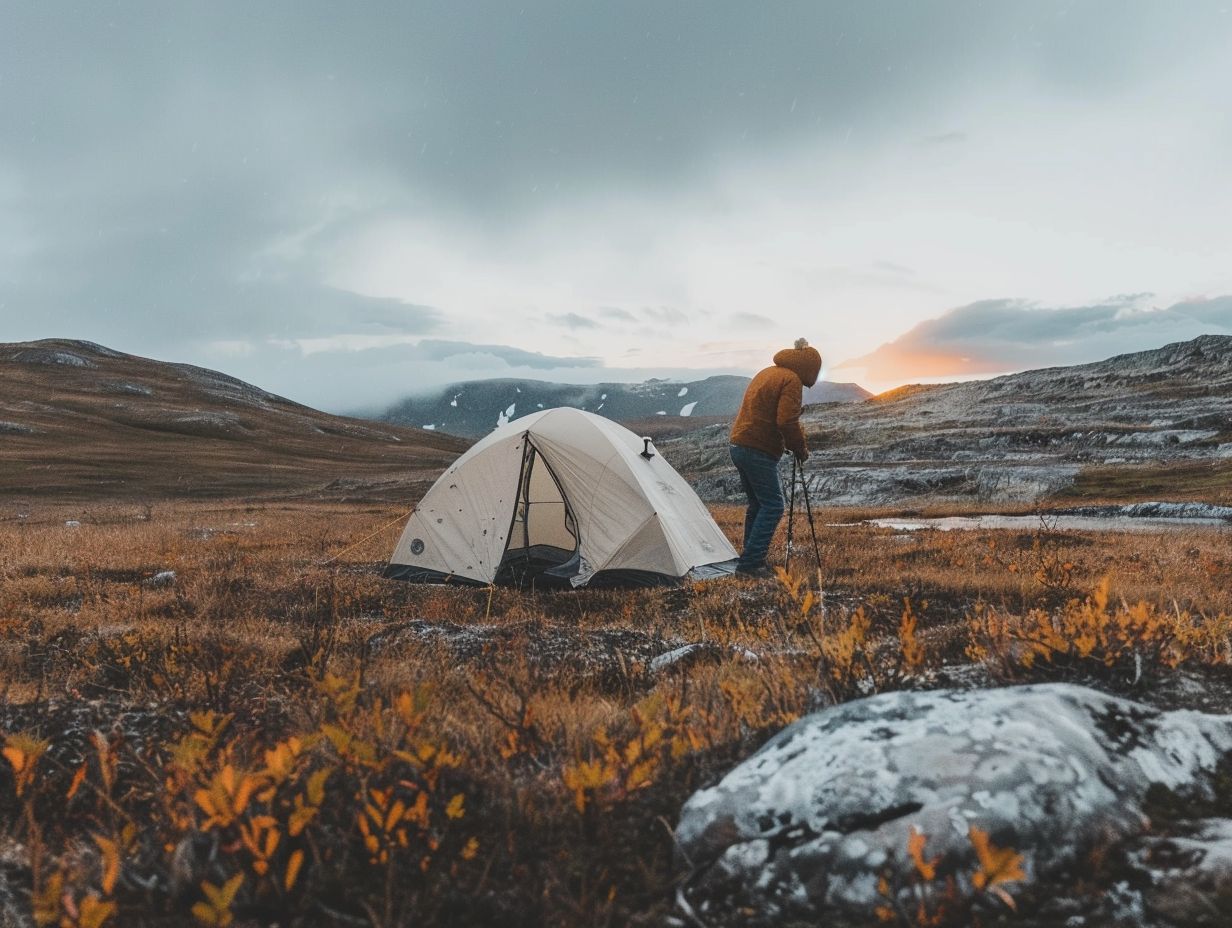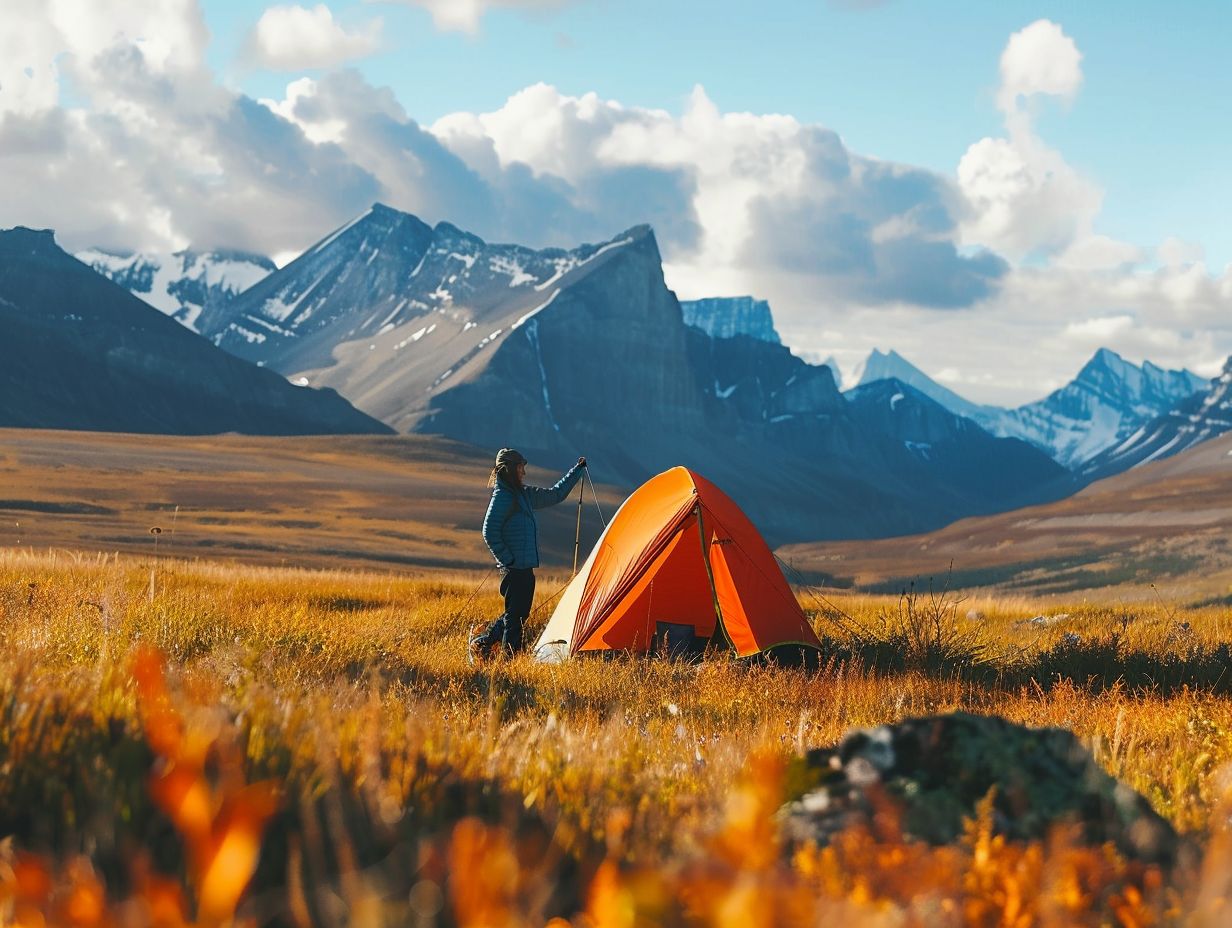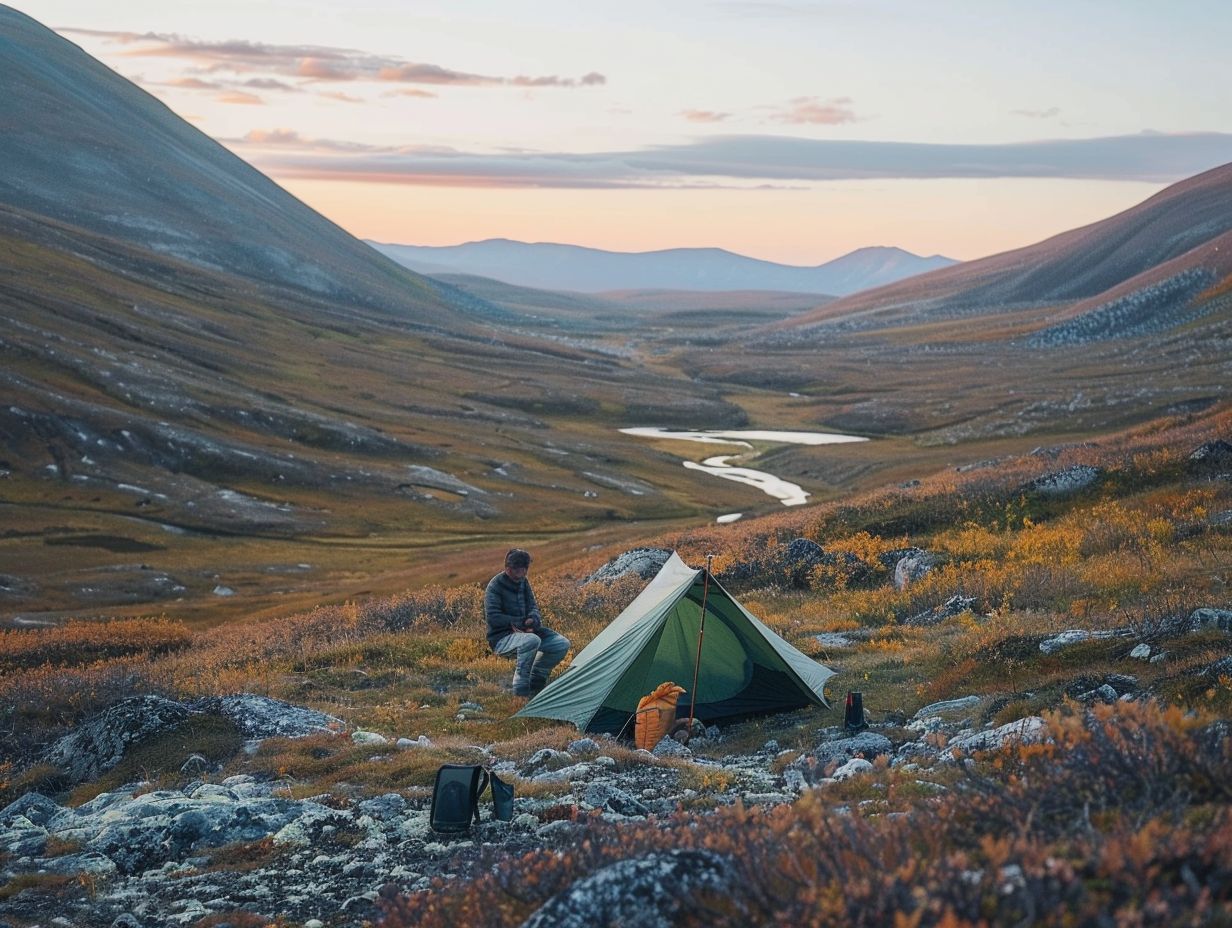If you are seeking a break from the fast pace of daily life and wish to connect with nature, wild camping could be an ideal adventure for you. Before venturing into the wilderness, you will need to acquire some essential skills and gear to guarantee a successful trip.
This article covers everything you should know, from navigation and map reading to setting up camp and procuring food and water, in order to maximise your wild camping experience. Prepare your gear and brace yourself for an unforgettable adventure!
Key Takeaways:

- Bring essential gear such as a tent, sleeping bag, and cooking supplies for a successful wild camping trip.
- Master navigation and map reading skills to ensure safe and efficient travel in the wilderness.
- Follow Leave No Trace principles to preserve the environment and minimise your impact while camping in the wild.
What is Wild Camping?
Wild camping refers to setting up a temporary camp in a natural environment, away from organised campsites and facilities. It involves immersing yourself in the wilderness and relying on basic survival skills to sustain through the camping trip.
Unlike traditional camping, which often involves campgrounds, amenities, and designated campsites, wild camping focuses on the raw experience of being close to nature without the comforts of modern conveniences.
When venturing into wild camping, individuals must possess self-sufficiency, resourcefulness, and adaptability to thrive in natural surroundings.
From foraging for food to purifying water sources, wild campers learn to rely on themselves and their skills to navigate the challenges of the wilderness, making it a truly immersive and adventurous experience.
Essential Gear for Wild Camping
To have a successful wild camping experience, it is essential to ensure you have the right gear and equipment. Key items to include are:
- Tents
- Sleeping bags
- Cooking utensils
- Navigation tools
- First aid kits
Must-Have Items for a Successful Trip
Certain items are essential for a successful wild camping trip. These include:
- a robust tent to provide shelter from the elements and serve as a safe haven during the night,
- a reliable compass to guide you through unfamiliar terrain and ensure you stay on course,
- a portable cooker for cooking hot meals and beverages to boost your energy levels,
- a quality sleeping bag to keep you warm and comfortable for restful sleep, and
- a comprehensive first aid kit to handle minor injuries and emergencies in remote locations, offering peace of mind as you immerse yourself in the great outdoors.
Navigation and Map Reading

Your ability to navigate and read maps is crucial when embarking on a wild camping adventure. Proficiency in using a compass and accurately interpreting maps is vital to avoid getting lost in unfamiliar surroundings.
Basic Skills and Techniques
Developing basic camping and survival skills is crucial for a safe and enjoyable wild camping experience. You need to acquire skills such as setting up a shelter, starting a campfire, and identifying edible plants to ensure wilderness survival.
Learning how to construct a sturdy shelter using natural materials found in the environment is a key aspect of wilderness survival. Understanding different shelter designs, such as lean-tos or debris shelters, can provide protection from the elements.
Mastering the art of building a campfire safely ensures warmth, cooking capabilities, and a sense of security in the wild. Additionally, being able to identify edible plants and avoid toxic ones is vital for foraging food sources in the wilderness, enhancing self-sufficiency during a camping trip.
Setting Up Camp
Ensuring a successful camp setup requires selecting a suitable campsite, securing your tent properly, and organising your camping gear effectively. A meticulously arranged campsite is crucial for providing a comfortable and secure camping environment.
Choosing a Campsite and Pitching a Tent
Selecting the right campsite and pitching your tent properly are crucial aspects of a successful wild camping trip. When choosing your campsite, it’s essential to consider factors such as proximity to water sources for convenience while maintaining a safe distance to prevent flooding risks.
A flat and elevated spot away from potential hazards like flood zones or falling branches is ideal for setting up camp. Prioritise Leave No Trace principles by avoiding fragile ecosystems and adhering to established trails to minimise your impact on the wilderness.
When pitching your tent, ensure it is taut to withstand wind and potential rainfall. Place a groundsheet underneath to protect the tent floor. Secure your tent with sturdy pegs and guy ropes to prevent it from shifting in changing weather conditions.
Food and Water for Wild Camping

Ensuring proper meal planning and securing clean water sources are essential for sustenance during a wild camping trip. Cooking nutritious meals over a campfire and staying hydrated are critical for maintaining energy and health in the wild.
Meal Planning and Water Sources
Effective meal planning and identifying reliable water sources are key components of a successful wild camping experience for you. Packing non-perishable, high-energy foods and locating freshwater streams or springs are vital for your outdoor sustenance.
By carefully considering your nutritional needs and the resources available in the wilderness, you can ensure that you have enough sustenance to fuel your adventures. It is recommended to opt for lightweight, calorie-dense items such as nuts, dried fruits, energy bars, and dehydrated meals that are easy to pack and provide essential nutrients.
Additionally, it is crucial that you invest in a reliable portable water filter or purifying tablets to treat water from rivers or lakes, which helps in reducing the risk of waterborne illnesses. Always remember to check local regulations and guidelines for gathering water in the wild.
Leave No Trace Principles
Adhering to Leave No Trace principles is crucial for minimising your impact on the environment while wild camping. It is important to practice responsible waste disposal, show respect for wildlife habitats, and ensure that natural spaces are left undisturbed in order to preserve the wilderness.
Minimising Your Impact on the Environment
Minimising your impact on the environment is a fundamental aspect of ethical wild camping. It is crucial to respect wildlife, avoid harming vegetation, and ensure that there are no visible traces left behind in the wilderness.
An effective approach to reducing your environmental footprint while wild camping is to follow the principles of Leave No Trace. This involves taking all rubbish, including biodegradable items, with you and disposing of waste in an appropriate manner. Using sustainable camping equipment like reusable or biodegradable utensils and containers can help minimise waste.
Opting for designated camping areas or low-impact campsites, where camping infrastructure is already in place, can also aid in safeguarding delicate ecosystems. By adhering to responsible outdoor practices and supporting conservation initiatives, you can play a role in preserving the natural splendour of the wilderness.
Frequently Asked Questions

What are the essential skills for wild camping?
The essential skills for wild camping include navigation, campsite selection and setup, fire building, cooking, water purification, and Leave No Trace principles.
How important is navigation in wild camping?
Navigation is crucial in wild camping as it helps you find your campsite, navigate back to familiar areas, and avoid getting lost. It is especially important to have map reading and compass skills when exploring unfamiliar territories.
What should I consider when selecting a campsite in the wild?
When selecting a campsite in the wild, consider factors such as terrain, accessibility, water sources, and natural hazards. Choose a flat and dry area away from potential hazards like dead trees or avalanche zones. Also, make sure to follow Leave No Trace principles when setting up your campsite.
How do I build a fire while wild camping?
Building a fire while wild camping requires knowledge of fire safety and Leave No Trace principles. Make sure to check for any fire restrictions in the area and gather dry tinder, kindling, and fuel for your fire. Use a fire ring or create a fire pit and properly extinguish the fire when done.
Can I cook while wild camping?
Yes, you can cook while wild camping, but it’s important to follow proper food safety guidelines. Bring along lightweight cooking equipment and pack out all food scraps to avoid attracting wildlife. You can also practice Leave No Trace principles by using a camp stove instead of building a fire for cooking.
How do I purify water while wild camping?
Purifying water while wild camping is essential for staying safe and healthy. You can use a portable water filter, purification tablets, or boil water for at least one minute to kill any harmful bacteria. Make sure to follow the manufacturer’s instructions for your chosen method.



